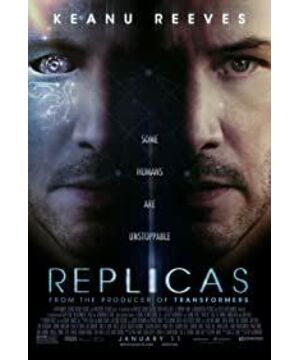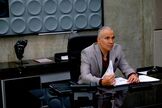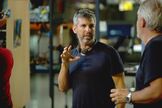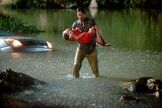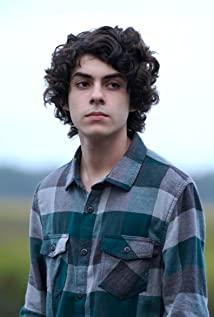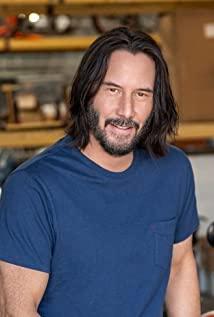Keanu Reeves is a conscientious movie star. Starting from "The Matrix", most of his films are very different. "The Matrix" is epoch-making, no one is faulty, no one questioned. Before that, "The Devil's Advocate" seemed to establish that his role was too serious (compared to the general level of Hollywood) and non-mainstream. "The Day the Earth Stood Still" is a re-translation of the classic, I think the effect is still very good, his role assumes the cliché, but after all, the meaning of rationality and on track. Many people say that his "Tai Chi Xia" is boring, but I think it is the first time to serious and rationalize the Chinese Kung Fu film born in Hong Kong. The story is rare and complete, and it will always be a perfunctory "mysterious". Provide an objective and clear explanation. The professional killer in "john wick" is also a bit of faith, and is not artificial, not exaggerated, and not funny.
When I watched "The Clone", I had expected that some people would say that it has a lower investment cost, and some people would say that it is a cliché. First of all, I think cost is not a critical issue for the quality of the movie, unless you just want to watch computer special effects. Furthermore, although the three words for human cloning are clichés, this time it has a rare quality of thinking. In the debate on ethics, he was restrained from beginning to end, and various possible technological breakthroughs gave considerable expression to ethical conflicts. And I am most interested in these few details.
1
When the scientist's wife mentioned ethical issues to him for the first time, she emphasized her belief in the soul. The scientist chose to be silent at the time. Watching the entire movie will understand that scientists are not hesitating, but just avoiding disputes. If a scientist believes in God, believes in the existence of an immaterial soul or the so-called element of will in philosophy, he is not a scientist. He chose to remain silent just to avoid fearless disputes. In the end he succeeded anyway.
2
When the wife learned that she was a copy, she quickly chose to accept it. This plot is to explain. In any case, the vested interest is an indisputable fact for the gainers of science and technology. It is undeniable and unshakable. It is also a reasonable move for scientists to choose to tell the truth, which is the attitude that scientists should have.
3
If the film continues to show the face-to-face conflict between the copied person and the copy person, that's a cliché. This face-to-face conflict is for the audience to feel that they are two people, not one person with synesthesia. There is nothing to say about this matter. This movie avoided this scene, but moved forward, deriving two ideas. The first is the fact that those with vested interests accept the facts and are content with the social role of the person being copied, of course, the premise is that the person being copied has disappeared. The second is that the boss readily accepted the scientist’s mediation conditions before he died. This situation is very similar to the anointing ceremony of a medieval king before his death. The archbishop or pope announces that his sins will be forgiven and promises to wait for his soul to enter the paradise. When facing death, people have no certainty and basis, so often, or can only choose a belief that he expects. The boss knew that he was going to die, he accepted the conditions of reincarnation in heaven, but he died anyway. He who was copied could not help him disappear, but he inherited the contract before the death of the copyee. So of course it can be said that the scientist lied to a contract, but the subtlety is that the dead are like accepting faith. Of course, no one knew what he felt in his mind the moment he closed his eyes.
4
The most scientific and hardest plot of this movie is not a scientist accidentally discovering the self-cognition of the brain, or the function of "I" in consciousness, or a philosophical temptation of what the self is, but the scientist duplicating himself to form a perfect Control conditions. This is a key factor that all sci-fi movies that involve scientific experiments fail to respect. Scientific research depends on experiment, and experiment depends on control. There is no point in not comparing everything. And the scientist prepares himself psychologically, and the copied scientist advances into the role of the prosthetic person, and says "This feeling is very strange, but it is really like myself", conveying the screenwriter or director's righteousness. Positive attitude towards physical technology. In fact, I also support this technique. Now that we can do it, we will do it sooner or later. Ethics will inevitably be expanded by technology. Ethics does not restrict mankind, but is used by mankind to regulate society during development. Ethics is only a part of mankind. Ethics is not everything. History has repeatedly proved that material progress is the only decisive factor.
5
If I can, I want to tout this movie as "dystopian." It is really black to the end. The combination of scientists and prosthetic scientists can be called the "most evil" sci-fi ending. The scientist's wife is extremely reasonable. The scientist's boss who didn't understand technology was finally conquered. The biologist who chose to be neutral in the face of human life (whether natural or cloned) was eliminated. These parts cannot but doubt that they carry some cryptic or subconscious wishes of the screenwriter or director.
Thinking of it, I forgot a little. One thing that touched me the most about this movie was the last time the scientist’s wife looked at each other with him. That place was very well shot. The couple who had been in a tacit understanding for many years didn’t need to open their mouths at all. They looked at each other in a panic in the car, and then the wife said, "Go, go, go," because the robot that jumped out to block the gun was also her. My husband, because that's a copy of the scientist's own consciousness, and that's a comparative observation that a scientist must never miss. The scientist ran back and stared at the robot and asked him "What does it feel like?" The robot said, "Maybe it sounds strange, but it really feels like myself." This is rarely seen and excited about a scientific experiment. The situation, this movie is really great.
View more about Replicas reviews


